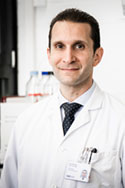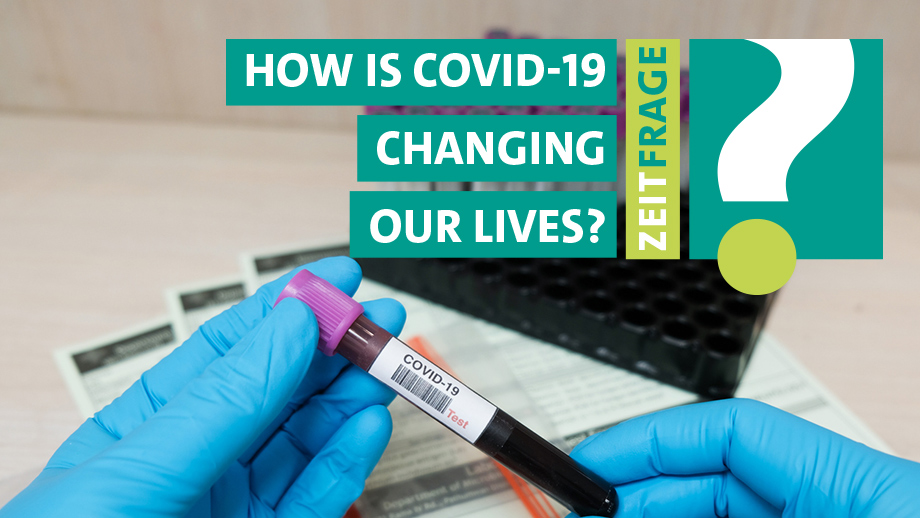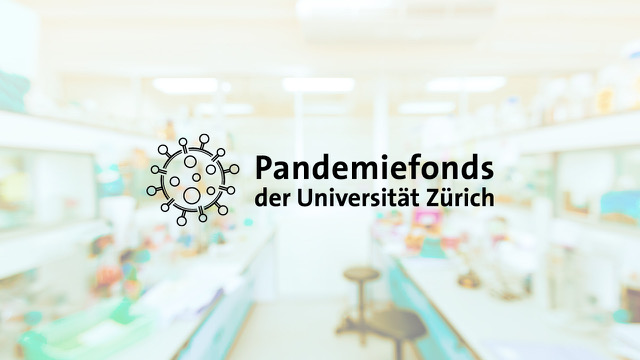UZH Researchers in the Fight Against Coronavirus
With its strong track record in life sciences research, the University of Zurich has an important contribution to make in tackling the current Covid-19 pandemic. The current situation means there is a pressing need for studies that will improve our understanding of the virus and the disease progression, and indicate possible ways out of the lockdown. Research resources are unfortunately limited.
The UZH Foundation, in cooperation with Vice President Medicine Beatrice Beck Schimmer and Vice President Research Michael Schaepman, has therefore launched a fundraising campaign for its new Pandemic Fund in order to raise additional funding for three urgent research projects. The aim is to generate 500,000 Swiss francs as soon as possible in the first instance to support selected projects. The selection criteria for the research projects receiving support is that they should contribute to providing a scientific basis for approaches to tackling the crisis, and as quickly as possible.
We present the three projects below in more detail.

1 – Recognizing high-risk patients in advance
How much has coronavirus spread in Switzerland and what influence are the government measures having? Are people immune following infection? These are two of the biggest questions right now. “Only a well-coordinated, Swiss-wide assessment of coronavirus immunity will give us any certainty,” says Milo Puhan, president of the SSPH+ and director of the Epidemiology, Biostatistics and Prevention Institute at UZH. “This information will then form the basis for constructive political decisions.” At the moment it is still not known how many people in Switzerland have already been infected with the coronavirus and may therefore have immunity against it. It is thought that the infection may run its course without symptoms in many people, or with minor symptoms that are confused with a common cold.
Under the umbrella of the Swiss School of Public Health (SSPH+), 12 Swiss higher education institutions are working together to identify the spread of the virus (www.corona-immunitas.ch). The University of Geneva has already made a start and achieved some important foundational work. It is planned to repeatedly test randomly selected people from three different age groups (under 20, 20 to 65 and over 65) in six regions of Switzerland (at least 200 people in each region).
Requiring support
In addition, depending on a canton’s needs, specific professions or vulnerable groups such as those living in care homes will also be tested. These tests will be repeated over a longer period of time in order to track the development of the epidemic and immunity, and the influence of the measures taken. Men, women and children will be selected at random. “The only fly in the ointment is the high cost, around 15 million francs,” says Puhan. “To secure the necessary funding, we need the support of the federal government and the cantons, as well as companies and individuals,” he adds. The SSPH+ is actively involved in raising money for this national initiative. The money donated via the UZH Foundation’s campaign will be used especially for data collection in the Canton of Zurich.
At the moment the current rate of infection in Switzerland is estimated, on the basis of models, to be around three percent. “That would be rather low, but we assume it is not more than 10 percent. However, there may be regional differences as well as differences between professions and social groups,” says Puhan. The coordination between the SSPH+ partners will ensure that the data is collected in the same way and using the same tests, so that the results can be compared. (mf)

II – Predicting patients at high risk for severe Covid-19
Current data suggests that most people with Covid-19 have only mild symptoms. Nevertheless, in some patients Covid-19 can lead to a life-threatening lung infection that requires intensive care in the hospital. The likelihood of suffering serious complications is not the same for everyone: People who are over the age of 65 or who have preexisting conditions are at high risk. In rare cases, severe disease can also occur in young people.
The medical reasons for severe Covid-19 are not yet clear. But getting to the bottom of the causes is crucial: “Identifying at a very early stage those patients who will develop severe disease would allow us to react more quickly and to give more targeted treatment, thus increasing the patients' chance of survival and using hospital resources more effectively,” explains Onur Boyman, professor of clinical immunology at UZH and director of the Department of Immunology at the UniversityHospital Zurich (USZ). He and Jakob Nilsson, senior consultant physician at the Department of Immunology at the USZ, are currently pursuing the goal of identifying patients who are at high risk of severe Covid-19.
Investigating the immune reaction
Their research will look into whether severe cases of Covid-19 could be connected either to a weak immune response or to a exaggerated inflammation. In other words, older patients become severely ill when their immune cells, in particular T and B cells, do not recognize the coronavirus enough to fight it. In contrast, severe Covid-19 in younger patients could be due to an uncontrolled inflammatory response to the SARS-Coronavirus-2. “To test these hypotheses, we are analyzing the immune response in patients newly diagnosed with Covid-19,” explains Boyman.
The research team wants to investigate all significant elements of the immune system using highly specific blood analyses. This includes testing the various cell types of the innate and adaptive immune system, as well as their reaction to the SARS-Coronavirus-2. “According to our hypothesis, older people with weak immune cells that do not react sufficiently are particularly at risk,” says Nilsson. To test whether the immune cells in young people, on the other hand, react too strongly with what is known as a cytokine storm, the researchers measure the cytokines – messengers of the immune system that contribute to immunity and inflammation.
Comprehensive evidence of antibodies
Moreover, the team examines the amount and type of antibodies. Using a sophisticated analysis, it is possible to identify antibodies against most viruses that infect humans – in total around 200 viruses. This will help the scientists find out whether antibodies produced in previous infections with other pathogens and still present in the body can help protect people against severe Covid-19.
“We will use mathematical models to compare our immunological measurements with the clinical data. We hope to be able to thereby identify individuals with a high risk of developing a severe form of Covid-19,” says Nilsson. This information could also influence the treatment options for these patients: Those with a weak immune response would be treated with antiviral drugs. Those with an overly strong immune response, on the other hand, would be better off with anti-inflammatory drugs. “Ultimately, our study results could provide important information for the production of an effective vaccine,” says Boyman. (hna)

3 – Understanding the immune response to the virus
To effectively manage the Covid-19 pandemic and a sensible easing of the lockdown measures, it is vital that we gain an in-depth understanding of the immune response. We know that with some viruses, such as measles, having the infection once can lead to lifelong protection, whereas with influenza viruses we can get ill again and again. How do our defenses react to the new Sars-CoV-2 virus? Do the antibodies formed during an infection protect us against a new infection – and if so for how long? Do children and young people who have had the infection without displaying symptoms build up protection? “In our studies we are investigating the antibody response in detail and thereby supporting the development of a new vaccine,” says Alexandra Trkola, director of the Institute of Medical Virology at UZH. She will lead the research in cooperation with medics from the UniversityHospital Zurich (USZ), the University Children’s Hospital Zurich, and family doctors in general practice.
It is already known that different people’s immune systems react to a Sars-CoV-2 infection in different ways. Special defense cells form various types of different antibodies (called immunoglobulins) that in a best-case scenario can inactivate the virus. They bind to characteristic molecular regions of the virus and thereby hinder its propagation. In this way, for example, the antibodies can bind to the needle-shaped protuberances on the virus surface which the virus needs to attack the cells. If they inactivate the virus and its propagation, they are called neutralizing antibodies. This immune response can be more or less strong depending on the type and amount of antibodies formed. At the Institute of Medical Virology, researchers have developed measuring systems in recent weeks that enable them to measure the immune response in terms of quality and quantity.
Contribution to vaccine development
In their studies, Trkola and her colleagues will investigate the blood serum of infected and recovered patients, looking for the presence of various types of immunoglobulins (IgA, IgG, IgM) in a time series analysis. This will show whether the immune response weakens over time and whether people who experience severe symptoms build up a longer-lasting protection or not. The studies should also show the extent to which the immune response differs in women and men. It is known that the illness more often takes a serious turn in men than in women. Further tests based on modified viruses will enable the researchers to measure the quality of the immune response. These studies will examine how effective the antibodies are at neutralizing the Sars-CoV-2 viruses. These findings will be significant for vaccine development, as they will give clues as to what can be expected of potential inoculants, and what should be focused on in the vaccine development.
“We need to gain a better understanding of the immune response and its development over time,” stresses the virologist. Any relaxing of the current measures depends to a high degree on this knowledge about the immune response. Only with this information will it be possible to estimate whether and how long a person has good, or at least partial, protection following an infection. The studies at the Institute of Medical Virology will therefore contribute to improved understanding of the immunity of the population, which can be taken into account when assessing a relaxation of the current measures. (sts)

